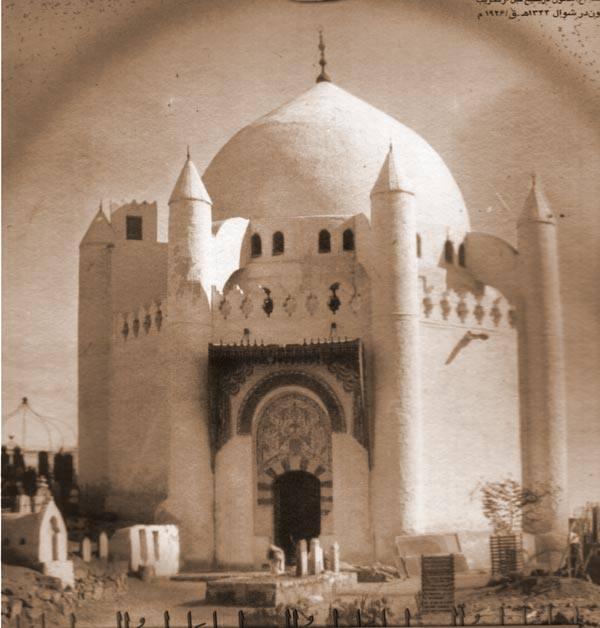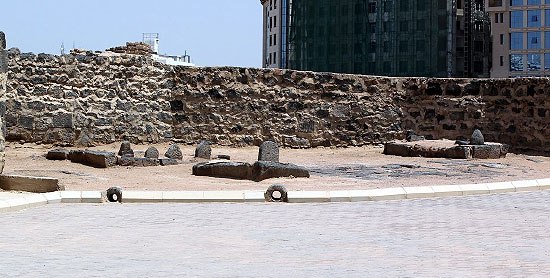صحیح بخاری کے مشہور شارح، بدر الدین عینی، اپنی کتاب عمدۃ القاری شرح صحیح بخاری، جلد ۱۴، صفحہ ۴۷۱؛ میں رقمطراز ہیں
وقال أيضا وأما تقبيل الأماكن الشريفة على قصد التبرك وكذلك تقبيل أيدي الصالحين وأرجلهم فهو حسن محمود باعتبار القصد والنية وقد سأل أبو هريرة الحسن رضي الله تعالى عنه أن يكشف له المكان الذي قبله رسول الله وهو سرته فقبله تبركا بآثاره وذريته وقد كان ثابت البناني لا يدع يد أنس رضي الله تعالى عنه حتى يقبلها ويقول يد مست يد رسول الله وقال أيضا وأخبرني الحافظ أبو سعيد ابن العلائي قال رأيت في كلام أحمد بن حنبل في جزء قديم عليه خط ابن ناصر وغيره من الحفاظ أن الإمام أحمد سئل عن تقبيل قبر النبي وتقبيل منبره فقال لا بأس بذلك قال فأريناه للشيخ تقي الدين بن تيمية فصار يتعجب من ذلك ويقول عجبت أحمد عندي جليل يقوله هذا كلامه أو معنى كلامه وقال وأي عجب في ذلك وقد روينا عن الإمام أحمد أنه غسل قميصا للشافعي وشرب الماء الذي غسله به
(ہمارے شیخ زین الدین نے) اسی طرح کہا کہ شریف مکانات/جگہوں کو تبرک کی نیت سے چومنے، اور اسی طرح نیک لوگوں کے ہاتھوں اور پیروں کو چومنا، یہ قصد و نیت کے اعتبار سے حسن اور ممدوح ہے۔ ابو ہریرہ نے امام حس سے کہا کہ مجھے وہ جگہ دکھائیں جہاں نبی پاک نے چوما۔ اور وہ ان کی ناف تھی، وہ انہوں نے وہ چوما، اس وجہ سے کہ نبی پاک کے آثار اور اولاد کی وجہ سے تبرک حاصل کریں-
اور ثابت البنانی انس کا ہاتھ تب تک نہ چھوڑتے جب تک چوم نہ لیتے، اور کہتے کہ اس ہاتھ نے نبی پاک کا ہاتھ مس کیا ہے۔ اسی طرح امام احمد بن حنبل سے قبر رسول اور منبر رسول و چومنے کے بارے میں پوچھا گیا، تو انہوں نے جواب دیا کہ اس میں کوئی حرج نہیں
شیخ فرماتے ہیں کہ میں نے دیکھا کہ ابن تیمیہ اس پر حیران ہوئے اور کہا: عجیب ہے! امام احمد تو میرے نظر میں بہت جلیل القدر ہیں، اور وہ اس طرح کی باتیں کر رہے ہیں- اور اس ضمن میں یہ بھی عجیب ہے- اسی طرح امام احمد سے مروی ہے کہ وہ امام شافعی کی قمیص دھوتے اور اس پانی کو پی جاتے جس سے قمیص دھوئی ہوتی
ابو ہریرہ کی جس روایت کی بات ہو رہی ہے، وہ مجمع الزوائد، جلد ۹، صفحہ ۱۰۵؛ پر یوں درج ہے
15045- وعن عمير بن إسحاق قال: رأيت أبا هريرة لقي الحسن بن علي فقال له: اكشف عن بطنك حيث رأيت رسول الله صلى الله عليه وسلم يقبل منه، فكشف عن بطنه فقبله.
15056- وفي رواية: فقبل سرته.
رواه أحمد والطبراني إلا أنه قال: فكشف عن بطنه ووضع يده على سرته.
ورجالهما رجال الصحيح غير عمير بن إسحاق وهو ثقة.
عمیر بن اسحاق نے کہا کہ میں نے دیکھا کہ ابو ہریرہ امام حسن سے ملے، اور کہا کہ اپنے پیٹ کو میرے لیے آشکارہ کریں جہاں میں نے دیکھا کہ نبی پاک نے چوما۔ پس انہوں نے آشکارہ کیا، اور انہوں نے چوما۔ اور دوسری روایت میں ہے کہ ان کے ناف کو چوما۔ احمد اور طبرانی نے روایت کی، اور راوی سارے ثقہ ہیں سوارئے عمیر بن اسحاق کے، اور وہ ثقہ ہیں
امام احمد کے جس قول کی طرف نشاندہی کی، وہ ان کی العلل و المعرفۃ الرجال، جلد ۲، صفحہ ۴۹۲؛ پر یوں درج ہے
3243 – سألته عن الرجل يمس منبر النبي صلى الله عليه و سلم ويتبرك بمسه ويقبله ويفعل بالقبر مثل ذلك أو نحو هذا يريد بذلك التقرب إلى الله جل وعز فقال لا بأس بذلك
امام احمد سے پوچھا گیا کہ ایک شخص منبر رسول کو چھوتا ہے، اور چھونے اور اسے چومنے سے تبرک حاصل کرنا چاہتا ہے۔ اور وہ یہ کام قبر کے ساتھ بھی کرتا ہے اور اس کا ارادہ اللہ کا قرب حاصل کرنا ہے۔ احمد بن حنبل نے جواب دیا کہ اس میں کوئی حرج نہیں
اب لگائیے شرک کے فتوے !!!
وقال أيضا وأما تقبيل الأماكن الشريفة على قصد التبرك وكذلك تقبيل أيدي الصالحين وأرجلهم فهو حسن محمود باعتبار القصد والنية وقد سأل أبو هريرة الحسن رضي الله تعالى عنه أن يكشف له المكان الذي قبله رسول الله وهو سرته فقبله تبركا بآثاره وذريته وقد كان ثابت البناني لا يدع يد أنس رضي الله تعالى عنه حتى يقبلها ويقول يد مست يد رسول الله وقال أيضا وأخبرني الحافظ أبو سعيد ابن العلائي قال رأيت في كلام أحمد بن حنبل في جزء قديم عليه خط ابن ناصر وغيره من الحفاظ أن الإمام أحمد سئل عن تقبيل قبر النبي وتقبيل منبره فقال لا بأس بذلك قال فأريناه للشيخ تقي الدين بن تيمية فصار يتعجب من ذلك ويقول عجبت أحمد عندي جليل يقوله هذا كلامه أو معنى كلامه وقال وأي عجب في ذلك وقد روينا عن الإمام أحمد أنه غسل قميصا للشافعي وشرب الماء الذي غسله به
(ہمارے شیخ زین الدین نے) اسی طرح کہا کہ شریف مکانات/جگہوں کو تبرک کی نیت سے چومنے، اور اسی طرح نیک لوگوں کے ہاتھوں اور پیروں کو چومنا، یہ قصد و نیت کے اعتبار سے حسن اور ممدوح ہے۔ ابو ہریرہ نے امام حس سے کہا کہ مجھے وہ جگہ دکھائیں جہاں نبی پاک نے چوما۔ اور وہ ان کی ناف تھی، وہ انہوں نے وہ چوما، اس وجہ سے کہ نبی پاک کے آثار اور اولاد کی وجہ سے تبرک حاصل کریں-
اور ثابت البنانی انس کا ہاتھ تب تک نہ چھوڑتے جب تک چوم نہ لیتے، اور کہتے کہ اس ہاتھ نے نبی پاک کا ہاتھ مس کیا ہے۔ اسی طرح امام احمد بن حنبل سے قبر رسول اور منبر رسول و چومنے کے بارے میں پوچھا گیا، تو انہوں نے جواب دیا کہ اس میں کوئی حرج نہیں
شیخ فرماتے ہیں کہ میں نے دیکھا کہ ابن تیمیہ اس پر حیران ہوئے اور کہا: عجیب ہے! امام احمد تو میرے نظر میں بہت جلیل القدر ہیں، اور وہ اس طرح کی باتیں کر رہے ہیں- اور اس ضمن میں یہ بھی عجیب ہے- اسی طرح امام احمد سے مروی ہے کہ وہ امام شافعی کی قمیص دھوتے اور اس پانی کو پی جاتے جس سے قمیص دھوئی ہوتی
ابو ہریرہ کی جس روایت کی بات ہو رہی ہے، وہ مجمع الزوائد، جلد ۹، صفحہ ۱۰۵؛ پر یوں درج ہے
15045- وعن عمير بن إسحاق قال: رأيت أبا هريرة لقي الحسن بن علي فقال له: اكشف عن بطنك حيث رأيت رسول الله صلى الله عليه وسلم يقبل منه، فكشف عن بطنه فقبله.
15056- وفي رواية: فقبل سرته.
رواه أحمد والطبراني إلا أنه قال: فكشف عن بطنه ووضع يده على سرته.
ورجالهما رجال الصحيح غير عمير بن إسحاق وهو ثقة.
عمیر بن اسحاق نے کہا کہ میں نے دیکھا کہ ابو ہریرہ امام حسن سے ملے، اور کہا کہ اپنے پیٹ کو میرے لیے آشکارہ کریں جہاں میں نے دیکھا کہ نبی پاک نے چوما۔ پس انہوں نے آشکارہ کیا، اور انہوں نے چوما۔ اور دوسری روایت میں ہے کہ ان کے ناف کو چوما۔ احمد اور طبرانی نے روایت کی، اور راوی سارے ثقہ ہیں سوارئے عمیر بن اسحاق کے، اور وہ ثقہ ہیں
امام احمد کے جس قول کی طرف نشاندہی کی، وہ ان کی العلل و المعرفۃ الرجال، جلد ۲، صفحہ ۴۹۲؛ پر یوں درج ہے
3243 – سألته عن الرجل يمس منبر النبي صلى الله عليه و سلم ويتبرك بمسه ويقبله ويفعل بالقبر مثل ذلك أو نحو هذا يريد بذلك التقرب إلى الله جل وعز فقال لا بأس بذلك
امام احمد سے پوچھا گیا کہ ایک شخص منبر رسول کو چھوتا ہے، اور چھونے اور اسے چومنے سے تبرک حاصل کرنا چاہتا ہے۔ اور وہ یہ کام قبر کے ساتھ بھی کرتا ہے اور اس کا ارادہ اللہ کا قرب حاصل کرنا ہے۔ احمد بن حنبل نے جواب دیا کہ اس میں کوئی حرج نہیں
اب لگائیے شرک کے فتوے !!!

